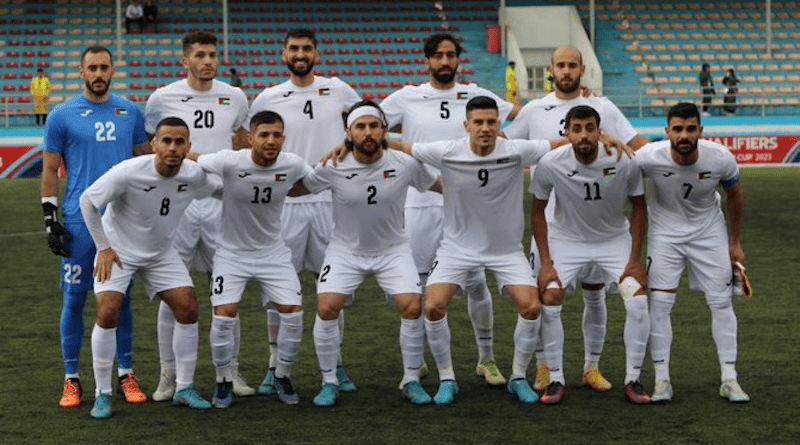Palestinian Sporting Achievements Are Political Acts – OpEd
By Ramzy Baroud
The Palestine national football team has, once more, achieved the seemingly impossible by qualifying for the 2023 AFC Asian Cup. By any standards, this is a great achievement, especially as the Palestinians did it in style with victories over Mongolia, Yemen and the Philippines this month without conceding a single goal. However, for Palestinians, this is hardly about sport. This accomplishment can only be appreciated within the larger context of the Israeli occupation of Palestine.
In November 2006, the Israeli military prevented all Palestine-based footballers from participating in their final match of the 2007 Asian Cup qualification group stage. This had a major demoralizing effect on all Palestinians. Even rare moments of hope and happiness are often crushed by Israel.
As disappointing as that Israeli decision was, it hardly compared to the collective shock felt by Palestinians everywhere when, in 2007, Palestinian players were not allowed to participate in a decisive World Cup qualifying game against Singapore. Instead of showing solidarity with Palestinians and condemning Israel, the sport’s world governing body FIFA decided to award an automatic 3-0 victory to Singapore.
This is why Palestine’s latest qualification is historic, as it is further proof that Palestinian resilience has no bounds. It also sends a message to Israel that its unjust draconian measures will never break the spirit of the Palestinian people.
This month’s achievement should also be placed in another context. It is the third time in a row that the Palestine national team has qualified for the Asian Cup finals, thanks to an impressive squad that represents all Palestinian communities, both at home and in the diaspora.
This moment is, however, bittersweet. Many Palestinian footballers who should have been present at the Sports Center Stadium in Ulaanbaatar, Mongolia — where the final qualification matches were held — were missing. Some are in Israeli prisons, others have been maimed or killed. Many of the killings took place in 2009. Indeed, 2009 was a terrible year for Palestinian football.
In January of that year, three players — Ayman Alkurd, Shadi Sbakhe and Wajeh Moshtaha — were killed during the Israeli war on the besieged Gaza Strip. All three were seen as promising youngsters with bright futures. Two months later, Saji Darwish was killed by an Israeli sniper near Ramallah. The 20-year-old was slated to become a big name in Palestinian football.
In July 2009, the tragedy of Mahmoud Sarsak began. Sarsak had only been a member of the national team for six months when he was arrested and tortured by Israel in a painful saga that lasted for three years. He won his freedom after undergoing a hunger strike that lasted for more than 90 days. The permanent health issues Sarsak was left with, however, meant that his once-promising football career was over.
Arrests, torture and killings of Palestinian footballers became a regular occurrence. This included the killing of legendary former player Ahed Zaqqut in 2014 and the deliberate shooting of the feet of teenagers Jawhar Nasser Jawhar and Adam Abd Al-Raouf Halabiya the same year.
These are just a few examples. The targeting of Palestinian sports is a constant item on the Israeli military agenda. Palestinian stadiums are often bombed during Israel’s brutal wars on Gaza. In 2019, the Israeli military attacked Al-Khader Stadium in Bethlehem, firing tear gas at players during a match. The same year, Palestinians could not hold a much-anticipated Palestine Cup final match because Israel prevented the Gaza-based Khadamat Rafah team from traveling to the West Bank to compete against FC Balata.
Like every aspect of Palestinian life that can easily be disrupted by Israel, the Palestinian sports community has learned to be resilient and resourceful. The national football team is the perfect example of this tenacity. When Gazan players are prevented from traveling, West Bankers come to the rescue. And when West Bank players suffer a setback of their own, Palestinian players in the diaspora are dispatched to take their place. Luckily, Palestinian footballers such as Oday Dabbagh are now gaining prominence in the international arena, giving them the chance to be available whenever duty calls.
When Palestine beat Mongolia 1-0 in the Asian Cup qualifiers on June 8, Palestinian media reported the euphoria and hope that was felt throughout Palestine. But when the national team, which is known as the Fida’i (freedom fighter), won their final two games with convincing victories of 5-0 and 4-0, hope turned into a real possibility that Palestine could perform well in the Asian Cup finals scheduled for next summer. And maybe the Fida’i could have a chance of qualifying for the World Cup in 2026.
For Palestinians, sports — especially football — remain a powerful platform for cultural resistance. Every aspect of a Palestinian football match attests to this claim. The names of the team, the fans’ chants, the images embroidered on the players’ jerseys and much more are all symbols of Palestinian resistance. In Palestine, football is a political act.
While Israel uses sports to normalize itself and its apartheid regime in the eyes of the world, it also does everything possible to impede Palestinian sports because it correctly understands that they are, at their core, acts of resistance.
It is heartbreaking to think that Alkurd, Sbakhe, Moshtaha, Darwish and others were not there to witness the celebrations of their beloved team’s qualification for a major international tournament. But it is the spirit of these valiant cultural warriors that continues to guide the Fida’i in their struggle for recognition, their fight for dignity and their quest for glory.

